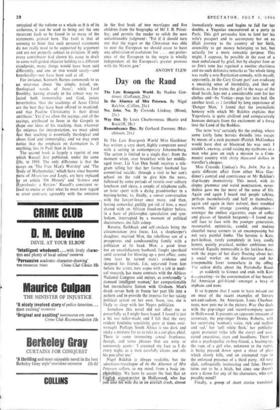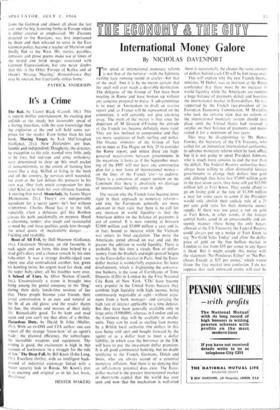Day on the Rand
In the Absence of Mrs Petersen. By Nigel Balchin. (Collins, 21s.)
No, John, No. By Cressida Lindsay, (Blond, 25s.) Way Out. By Louis Charbonneau. (Barrie and Rockliff, 18s.) Remembrance Day. By Gerhard Zwerenz. (Hut- chinson, 21s.)
IN The Late Bourgeois World Miss Gordimer has written a very short, highly competent novel with a setting in contemporary Johannesburg. The action is limited to a single day: from the moment when, over breakfast with her middle- aged lover, Liz Van Den Sandt receives a tele- gram telling her that her former husband has committed suicide; through a visit to her son's school on the veld to give him the news, followed by some periods of reverie over solitary luncheon and siesta, a couple of telephone calls, an hour spent with a dying grandmother in a nursing-home; to, finally, a sunset conversation with the lawyer-lover once more, and then, having somewhat guiltily got rid of him, a meal shared with an African freedom-fighter before, in a haze of philosophic speculation and sym- bolism, interrupted by a moment of political decisiveness, she falls asleep.
Reverie, flashback and self-analysis bring the circumstances into focus. Liz, a shopkeeper's daughter, married Max, the rebellious son of a prosperous and condescending family with a politician at its head. Max, a good lover but an unsatisfactory husband, fought apartheid until arrested for blowing up a post office; some time later he turned state's evidence and shopped his friends. Liz, separated from him before the arrest, now copes with a job in medi- cal research, has many contacts with the African National Congress and enjoys, as confessedly 'a damned intelligent woman,' her companionable but inconclusive liaison with Graham. Max's death serves both to freeze her past life into a pattern and to provide the impetus for her taking political action on her own. Soon, too, she is likely to sleep with her Negro politician.
Somehow this novel did not affect me as powerfully as I might have hoped. I found it just a bit too tailor-made and I felt that the very evident feminine sensitivity grew at times over- wrought. Perhaps South Africa is too dark and sticky a mixture for us to take in a cut-glass phial. There is some interesting sexual frankness, though, and some phrases that are witty or sensuously acute: 'I creamed my face as I do every night, as a man carefully cleans and oils his gun after use.'
Nigel Balchin is always readable, but the adventure-travelogue of In the Absence of Mrs Petersen suffers, to my mind, from a basic im- plausibility. We have to accept the fact that an Escreenwriter in Hollywood, who has semi firS;ifedie in an ait'C-raft crash, almost immediately meets and begins to fall for her double, a Yugoslav encountered at a party in Paris. This girl persuades him to lend her his wife's passport and to accompany her on an illicit journey to the country of her birth, ostensibly to get money belonging to her, but actually for a more romantic purpose. This might, I suppose, be possible in the case of a man unbalanced by grief, but by chapter four or so Jim's tone has regained a routine chattiness and no such defensive remarks as 'the whole thing was really a wry-Ruritanian comedy, with myself, apparently, in the Cary Grant part' can eradicate a sneaking sense of incredulity, and then of distaste, as Jim trains the girl in the ways of the dead Sarah, lays out a considerable sum for her clothes and—by Venice—pops her into bed. On another level, ar..1 fortified by long experience of `Danger Man,' I found that the journalistic honesty with which Mr Balchin explains that Yugoslavia is quite civilised and comparatively humane detracts from the excitement of a foray into the Land of the Baddies.
The term 'wry' certainly fits the ending, where some fairly lame heroics dwindle into escape by means of a cash payment (Patrick McGoohan would have shot or blustered his way out). I couldn't, anyway, avoid raising my eyebrows at a man who goes on such a mission to a Com- munist country with thirty thousand dollars in traveller's cheques.
Miss Cressida Lindsay's No, John, No is a quite different affair from either Miss ,Gor- dimer's control and contrivance or Mr Balchin's slap-happy insensitivity. This novel, with its sloppy grammar and weird punctuation, never- theless gave me far more of the sense of life. Again and again I heard real people talking, perhaps inconclusively and half to themselves; again and again in their naiveté, their troubled warmth, their strange yawning abruptness— amongst the endless cigarettes, cups of coffee and glasses of Spanish burgundy—I found -my- self face to face with the younger generation, resourceful, optimistic, candid, and making cheerful messy corners in an encompassing but not very painful limbo. The heroine is Kate, part-lesbian, rarely completely in love, coolly honest, quietly practical, neither ambitious nor Worried. Equally memorable is the feckless Rose. with the pages of her diary floating about her, a social worker on the doorstep and , her
irresponsible lover somewhere in the offing. The action drifts about the Portobello Road, s .ps suddenly to Greece and ends with Kate disappearing—to the consternation of her beauti- ful American girl-friend—amongst a bevy of orphans and nuns.
It so happens that I seem to have missed out on most of the recent examples of literary sex-and-sadism. An American, Louis Charbon- neau, now puts me in the picture. Way Out deals with the pop-singer and record-company scene in Hollywood. It presents an apparent innocent of seventeen, the pop-singer Donna Roberts, with her surprising 'woman's voice, rich and mellow and sad,' her 'soft white flesh,' her publicity- agent protector (who tells the story) and asso- ciated executives, stars and hoodlums. There is also a psychopathic ex-boy-friend, a beating-up, the rape of a girl who, unknown to the rapist, is being pressed down upon a sliver of glass which slowly kills, and an attempted rape 'in the enforced presence of a third party. All very slick, colloquially insinuating and false. Donna turns out to be a bitch, but since one doesn't care a damn for any of the characters, who can possibly mind?
Finally, a group of short stories translated from the German and almost all about the last war and the big, haunting limbo in Europe which it either created or emphasised. Mr Zwerenz deserted to the Russians, was first imprisoned by them and then released to serve in the East German police, became a teacher of Marxism and finally fled to the West. His stories, parables, fantasies and prose poems make use at times of the turgid and lurid images associated with German Expressionism, but one never doubts that this is the Other Europe of Kafka and of Owen's 'Strange Meeting.' Remembrance Day may be uneven, but it certainly strikes home.
PATRICK ANDERSON































 Previous page
Previous page